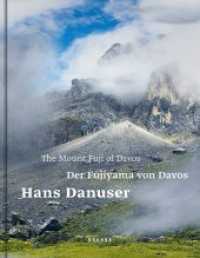- ホーム
- > 洋書
- > 英文書
- > Philosophy
Full Description
This volume explores the influence of the Socratic legacy in the Russian, East European, and Soviet contexts. For writers, philosophers, and artists, Socrates has served as a potent symbol—of the human capacity for philosophical reflection, as well as the tumultuous (and often dangerous) reality in which Russian-speaking and Soviet intellectuals found themselves. The thirteen chapters include surveys of historical periods and movements (the 18th century, Nietzscheanism, and the "Greek Renaissance" of Russian culture), studies of individual writers and philosophers (Skovoroda, Herzen, Dostoevsky, Rozanov, Bely, Narbut, and many others), and investigations of Socratic subtexts (e.g., in Bulgakov's Master and Margarita and Nosov's Neznaika series for children). The volume concludes with a "Socratic Texts" section of new translations. The plurality of these topics demonstrates the continued relevance of the Socratic myth not only for Russian-speaking culture, but for the world.
Contents
Contents
Foreword
Acknowledgements
Notes on Contributors
Introduction
Alyssa DeBlasio and Victoria Juharyan
1 Socrates in the Philosophy and Intellectual Culture of the Russian Enlightenment
Tatiana Artemyeva
2 The Poet Hryhory Skovoroda: Knowledge as a Process
Erica Camisa Morale
3 Elenchus from Other Shores: Alexander Herzen's Dialogue in Absentia
Arpi Movsesian
4 Writing the Russian Socrates: Dostoevsky, Skovoroda, and the World of The Brothers Karamazov
Brian Armstrong
5 A Symposium with Vasily Rozanov
Irina Erman
6 Anti-Socratic Attitudes in Russian "Nietzscheanism"
Andrea Oppo
7 Gustav Shpet and the Greek Renaissance of Russian Thought
Liisa Bourgeot
8 "Skovoroda's Way" in the Russian Symbolist and Post-Symbolist Tradition
Vadim Besprozvany
9 Between a Satyr and an Eccentric: Nikolai Bugaev as a Russian Socrates in Andrei Bely's Works
Daria Solodkaia
10 Conversations with Socrates: The Image of Socrates in Russian and Soviet Philosophical Literature
Olga Lyanda-Geller
11 The Fear of the Word: Socratic Subtext in the Yershalaim Chapters of Mikhail Bulgakov's Master and Margarita
Ksenia Radchenko
12 Maieutics for Socialist Children: Nikolai Nosov's Neznaika and the Epistemology of Know-Nothingness
Denis Saltykov
13 Socrates as Symbol: Alexander Herzen, Merab Mamardashvili, and Alexander Pushkin
Alyssa DeBlasio
14 Socrates the Greek Teacher
Leo Tolstoy and Aleksandra Kalmykova
15 Grigory S. Skovoroda
Leo Tolstoy
16 All-Divergence: The Teachings of Iakov Abramov as Interpreted by His Disciples
Mikhail Epstein
Index







